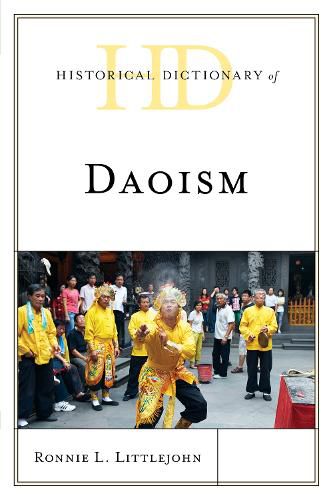Readings Newsletter
Become a Readings Member to make your shopping experience even easier.
Sign in or sign up for free!
You’re not far away from qualifying for FREE standard shipping within Australia
You’ve qualified for FREE standard shipping within Australia
The cart is loading…






Daoism is the oldest indigenous philosophic-spiritual tradition of China and one of the most ancient of the world’s spiritual structures. The name Daoism comes from the term dao, which meansa way or a road through the field or woods to one’s village. It is also means the way to do something, such as how a master craftsman carves wood, makes a bell, or even butchers an ox. But dao is also a nominative in the history of Daoism, referring to the energizing process that permeates and animates all of reality and moves it along. However, both text and practice in this tradition insist that dao itself cannot be described in words; itis not God in the sense of Western philosophy or religion. Daoism has no supreme being, even if there is an extensive grammar about nominally self-conscious entities and powers for which the Chinese use the word spirit (shen). For example, the highest powers of Daoism are variously called Taishang Laojun (the deified Laozi), the Celestial Worthy of Primordial Beginning (Yuanshi tianzun), the Jade Emperor (Yuhuang Shangdi), or the Perfected Warrior (Zhenwu). But these are expressions of dao in specific shen; they are not identical to Dao, except in the most unique case-when Laozi, the putative founder of Daoism and author of its major work, Daodejing, is said to be one with the dao.
Historical Dictionary of Daoism contains a chronology, an introduction, appendixes, an extensive bibliography, and more than 400 cross-referenced entries related to the Chinese belief and worldview known as Daoism, including dozens of Daoist terms, names, and practices. This book is an excellent resource for students, researchers, and anyone wanting to know more about Daoism.
$9.00 standard shipping within Australia
FREE standard shipping within Australia for orders over $100.00
Express & International shipping calculated at checkout
Daoism is the oldest indigenous philosophic-spiritual tradition of China and one of the most ancient of the world’s spiritual structures. The name Daoism comes from the term dao, which meansa way or a road through the field or woods to one’s village. It is also means the way to do something, such as how a master craftsman carves wood, makes a bell, or even butchers an ox. But dao is also a nominative in the history of Daoism, referring to the energizing process that permeates and animates all of reality and moves it along. However, both text and practice in this tradition insist that dao itself cannot be described in words; itis not God in the sense of Western philosophy or religion. Daoism has no supreme being, even if there is an extensive grammar about nominally self-conscious entities and powers for which the Chinese use the word spirit (shen). For example, the highest powers of Daoism are variously called Taishang Laojun (the deified Laozi), the Celestial Worthy of Primordial Beginning (Yuanshi tianzun), the Jade Emperor (Yuhuang Shangdi), or the Perfected Warrior (Zhenwu). But these are expressions of dao in specific shen; they are not identical to Dao, except in the most unique case-when Laozi, the putative founder of Daoism and author of its major work, Daodejing, is said to be one with the dao.
Historical Dictionary of Daoism contains a chronology, an introduction, appendixes, an extensive bibliography, and more than 400 cross-referenced entries related to the Chinese belief and worldview known as Daoism, including dozens of Daoist terms, names, and practices. This book is an excellent resource for students, researchers, and anyone wanting to know more about Daoism.